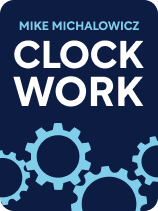

This article is an excerpt from the Shortform book guide to "Clockwork" by Mike Michalowicz. Shortform has the world's best summaries and analyses of books you should be reading.
Like this article? Sign up for a free trial here.
What is meant by hands-off leadership? How does taking your hands off your business help you take it to the next level?
Hands-off leaders don’t get mired in the minutia of daily operations. Instead, they train their employees to independently run all the daily functions and focus on making improvements to their company’s framework.
Keep reading to learn about the benefits of hands-off leadership, according to Mike Michalowicz.
Become a Hands-Off Visionary
In his book Clockwork, entrepreneur Mike Michalowicz explains how business leaders can adopt a hands-off leadership approach to running a business. This enables the leader to instead play the role of visionary, a role which suits their entrepreneurial spirit and offers the luxury of ample time off.
(Shortform note: In The Dichotomy of Leadership, authors Willink and Babin argue that a hands-off approach works for any form of leadership. Like Michalowicz, they advocate for an approach in which you empower your team to assume greater responsibility so you can focus on overseeing big-picture concerns. Their argument that this style works for any type of leadership suggests that you can practice a hands-off approach and accelerate your mastery of it in areas of your life beyond your business. For example, practice using a hands-off approach when organizing a family reunion by delegating tasks to other family members.)
A hands-off approach offers an entrepreneur three advantages over a hands-on approach:
- An escape from crisis mode. Whereas a hands-on entrepreneur reacts to crises, a hands-off visionary proactively prevents crises by mending fractures in their company framework before they worsen. Hands-off visionaries have time to proactively prevent crises because their employees handle daily operations.
- Better work-life balance. While building and fixing the company’s framework is important, it’s less time-sensitive than hands-on work and crisis management. Since their work is less urgent, a hands-off visionary has the flexibility to decide when and how much to work.
- Renewed motivation. Free from crisis mode and a constraining schedule, hands-off visionaries have the mental, physical, and emotional energy to revitalize their business.
| Is a New Leadership Approach Enough to End Burnout? Michalowicz implies that adopting a hands-off approach will automatically allow you to escape crisis mode, improve your work-life balance, and revive your motivation. However, you could commit yourself to a hands-off leadership approach and still work too many hours doing it. This could be a sign you’re addicted to work and need support. Work addiction involves a vicious cycle similar to the one people with substance abuse issues experience: Intoxication. The cycle begins when you derive positive feelings from working hard, such as boosted self-esteem. Withdrawal. Next, you begin to experience guilt or longing any time you’re not working. Craving. To relieve the discomfort of withdrawal, you keep working. As this cycle continues and you repeatedly succumb to your work craving, this addiction degrades your physical, emotional, and mental health. You find yourself in crisis mode, your work-life balance suffers, and your motivation declines. Here are ways to address these three issues: Escape crisis mode by connecting with a mental health professional. They can evaluate you to determine if you have a work addiction and provide guidance around overcoming it. Ask a friend to hold you accountable to your goal of achieving a better work-life balance. Report to them how much you work each week and how much you plan to work next week. Renew your motivation by replacing your craving for work. Instead of meeting your need for positive feelings by working long hours, identify and engage in non-work-related, sustainable activities that bring you joy and motivation. Examples include making music, enjoying nature, and playing a sport. |

———End of Preview———
Like what you just read? Read the rest of the world's best book summary and analysis of Mike Michalowicz's "Clockwork" at Shortform.
Here's what you'll find in our full Clockwork summary:
- How you can take a four-week vacation as a small business owner
- How to avoid burnout as an entrepreneur
- Why a hands-on approach to leadership is usually not the best method






